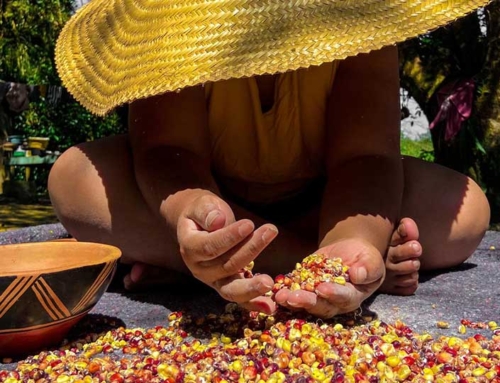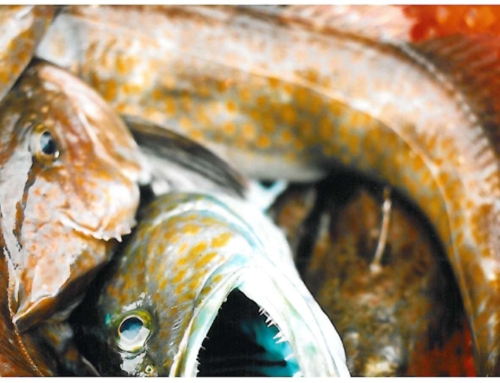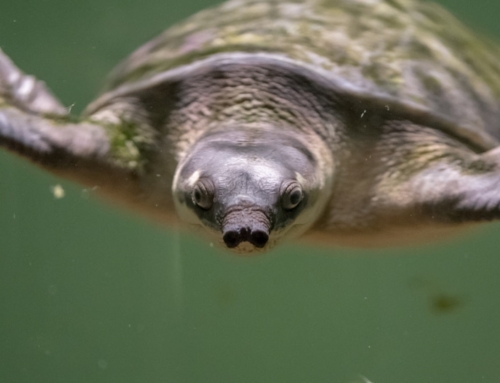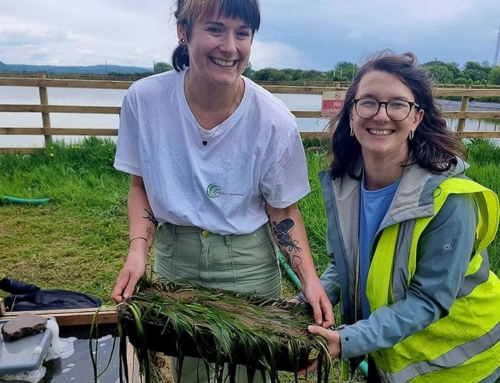The Cook Islands are a group of 15 volcanic islands in the southern Pacific Ocean, making up a self-governing island country in free association with New Zealand. Cook Islanders have mixed Polynesian ancestry and rich cultural traditions with deep connections to their land and waters.
Our Ocean and Biocultural Diversity Programmes partner Kōrero o te `Ōrau Inc. works with Cook Islands communities to revive and restore cultural traditions and conserve their natural environment.
Low clouds are rolling down to the coast from the distant hills, but the sea is calm, and the atmosphere is one of excitement. It is the day that the Marumaru Atua is setting sail, with a crew heading to Hawai’i for the Festival of the Pacific Arts.
The Marumaru Atua is a traditional canoe of the Cook Islands. It is more than just a vessel—it represents the ‘vaka’ (voyage) tradition, which includes the knowledge and skills of ocean navigation that play an important part in the rich cultural history of the Cook Islands.
The students of Kōrero o te ‘Ōrau’s ‘Ātui’anga ki te Tango programme have prepared a special send-off for this vaka, with Rennie Tamangaro leading Ivitū, a pe’e (chant) composed by Papa Tepoave Araitia. Their energy stirs a passionate excitement into the air.
“I cannot wait until one day in the near future when someone else says this karakia to me as I get ready for my voyage of a lifetime,” says Rennie, beaming from ear to ear in the short film Kōrero o te `Ōrau Inc. have produced to mark the occasion.
That day might not be far off- in 2021, Kōrero organised an education and advocacy project where students embarked on a two-month vaka voyage to the islands in the northern and southern groups of the Cook Islands. The voyage included visiting eight islands, connecting students with their heritage and allowing them to glimpse into the lives of their ancestors, while also learning how to conduct ecological surveys.
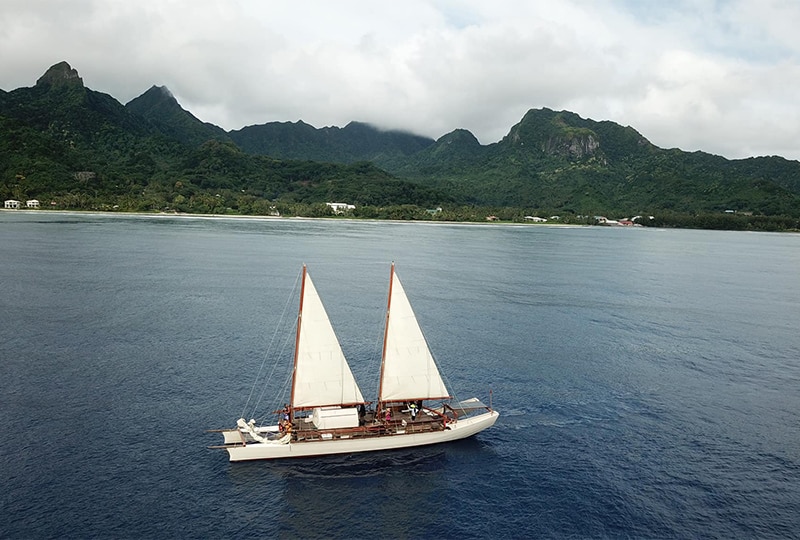
The vaka Marumaru Atua is not only a vessel for people, but a vessel of traditional knowledge and ocean navigation. © Sei Media (Teupoko Ariihee)
Cultural traditions of the Cook Islanders
Polynesian people from Tahiti settled in the Cook Islands in the 6th century, and the culture of Cook Islanders today still reflects those Polynesian origins, the influences of the subsequent colonisations (Portuguese and British), but has also been shaped by the living history of the people of these fifteen islands as their traditions have evolved.
The vaka voyages and ocean navigation skills show how their culture is deeply intertwined with the ocean. Vaka voyaging is an ancient Polynesian tradition where traditional outrigger boats are guided using generational navigational techniques.
The connections between the Cook Islands culture and the natural world go beyond just their knowledge of the ocean. The name of our partner, Kōrero o te `Ōrau, means ‘knowledge of the land, sea, and sky’. As an organisation, they combine local ancestral knowledge and modern scientific findings to create an overarching outlook on their environment and particularly focus on reconnecting younger generations with their cultural heritage.
Ātui’anga ki te Tango is the organisation’s youth programme, dedicated to educating and increasing awareness among Cook Islanders about natural resources, sustainable practices, and conservation on the island. For example, agriculture teachings about the ‘ūtū – king banana – and clearing invasives around them are lessons into food security and sustainability. There are also classes about how climate is affecting the Cook Islands.
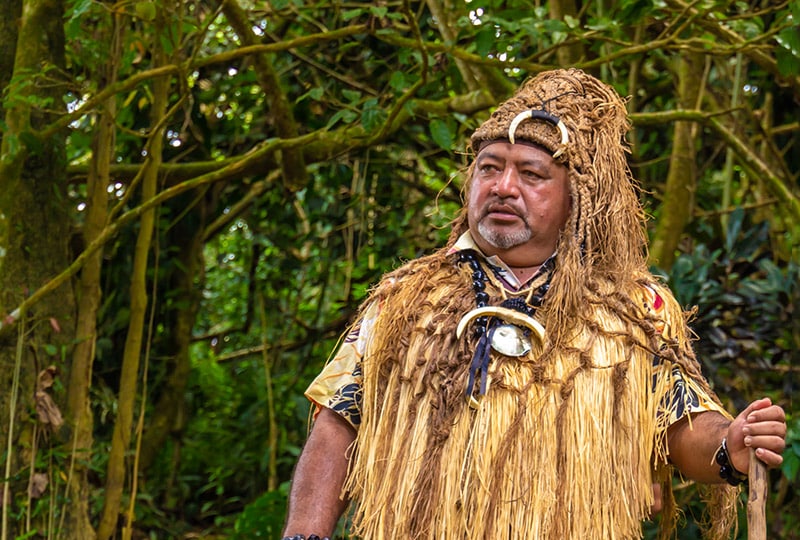
Danny Mataroa, one of the Indigenous elders involved with teaching cultural practices as part of the youth programme Ātui’anga ki te Tango. © Sei Media (Teupoko Ariihee)
Extracting underwater invaders
A practical way the young people in the Ātui’anga ki te Tango programme can get involved with marine conservation is through one of Kōrero’s largest initiatives – Operation Taramea.
The taramea (or crown-of-thorns starfish) is an invasive species which were discovered in outbreak numbers on Mitiaro in 2019 and Rarotonga in 2020. Small numbers of taramea build coral diversity but an outbreak can kill an entire reef. The Cook Islands have had two historical outbreaks in the 1970s and the 1990s where reefs were decimated and destroyed by the taramea.
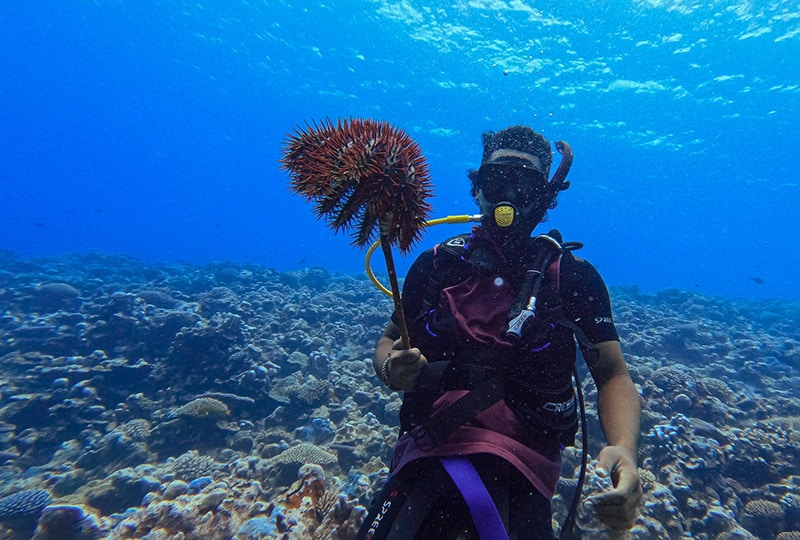
A young scuba diver collecting taramea from the seafloor. © Kōrero o te `Ōrau Inc.
Operation Taramea teaches young islanders to scuba dive and remove the taramea. Since Kōrero started monitoring and extracting the species, over 12,000 taramea have been removed as of October 2024 – over twelve rugby/football fields worth of coral saved. We highly recommend watching this charming video by Kōrero o te `Ōrau where young conservationist Mama Ra explains how taramea are collected and used as compost (between quite a lot of giggles):
Reviving traditions
Kōrero’s mission is ‘to improve the wellbeing of the Indigenous people of the Cook Islands and our environment’ and not only do they carry out this mission, but they also encourage youth to do the same. With this they spread their mission across generations to ensure the future of the Cook Islands is in prepared and passionate hands.
A key strand of our Ocean Programme is Communities and Culture, which includes supporting the revitalisation, celebration, and regeneration of sacred sites, rituals, languages, and practices that are linked to the ocean. This overlaps with our Biocultural Diversity Programme, which supports the relationships between cultures and conservation.
If you are interested in supporting this work, please get in touch.


